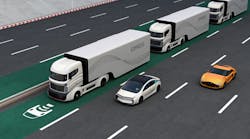The hype promising driverless trucks on our highways may be a wee bit premature, according to a recent study conducted by ABI Research. Nearly half (44%) of respondents say they’re not even aware of the use of autonomous vehicles for transport.
Robots, on the other hand, are increasing in popularity and usage. Thirty percent of all U.S. companies plan to introduce robotics into their operations within the next year, according to the ABI Research study. The survey included 455 U.S. companies across a number of verticals, including manufacturing, retail, transportation and logistics. Another 22% of respondents say they are actively assessing the technology.
That leaves nearly half (48%) of all companies still taking a wait-and-see approach to robotics. Despite notable near-term progress in robotics deployments among the respondents to support e-commerce and delivery growth, their lack of familiarity with nascent technologies such as augmented reality, blockchain, 5G, autonomous vehicles, AI, and the related ecosystem for transportation technologies is impacting potential adoption.
“Transportation providers may view intelligent transportation technologies as solutions to evolve their existing transportation operations versus opportunities for developing new revenue streams & business models,” says Susan Beardslee, senior analyst at ABI Research. “These players also show concern for legacy systems integration and comprehension of the complexity/fragmentation of their supply chain.”
Survey respondents find that intelligent transportation technology benefits are frequently linked to promoting workforce collaboration, centralized IT and operations frameworks, as well as workforce mobility. Primary barriers to adoption include data security and privacy concerns, alignment with existing legacy framework, and associated costs of technology adoption. Respondents also expect limited impact of delivery drones over the next two years; 40% do not see a role for this in their businesses within that timeframe.
Key survey findings concerning attitudes toward, and perceived benefits of, key technologies include:
Operational Data Management: There is a disconnect amid rising “co-optition” and respondents do not see consolidation with a reluctance to share data. Only 2% of respondents highly rank sharing operational data with peers and only 14% with key partners.
Freight as a Service: 34% of respondents favor Freight as a Service for its ability and flexibility to choose loads and routes dynamically, but only 2% of respondents highly anticipate that it will grow their customer bases.
V2X (vehicle-to-everything): End-to-end cargo tracking (38%) and vehicle monitoring (36%) saw the strongest results corresponding with industry growth.
Artificial Intelligence: Only 4% of respondents rank navigation & guidance applications as a priority. AI remains a nascent technology, but it is critical to the adoption of autonomous vehicles.
“Notable challenges remain to digitize, automate and transform the transportation industry, especially with the very long tail of owner-operators and small fleets,” notes Beardslee. “Support of emerging technologies draws mixed reactions, with over-the-air building awareness. But respondents still see other compelling technologies, such as gateways, as nascent to the transportation industry. We expect to see this increase soon to effectively link vehicles and assets to operations.”



